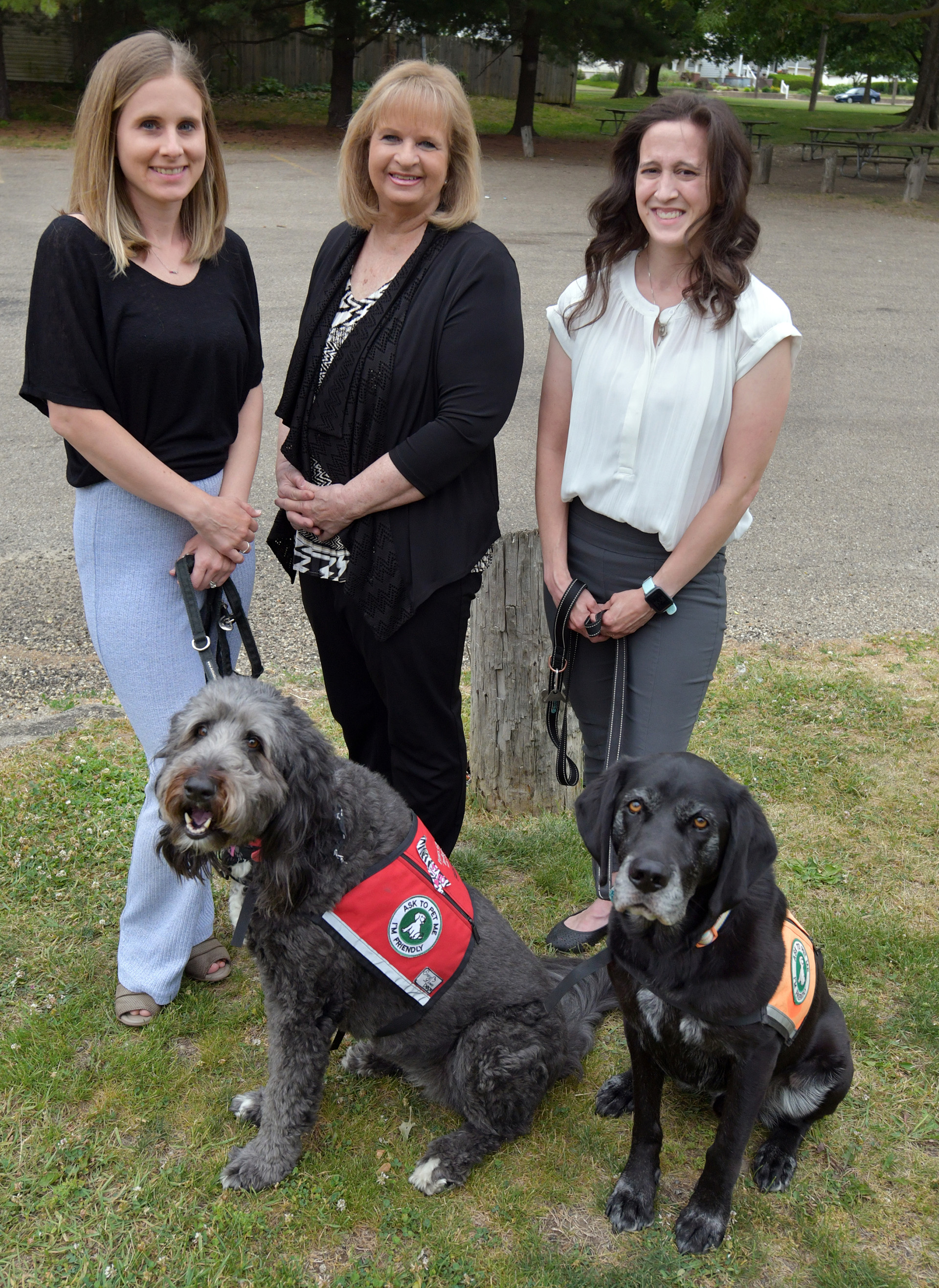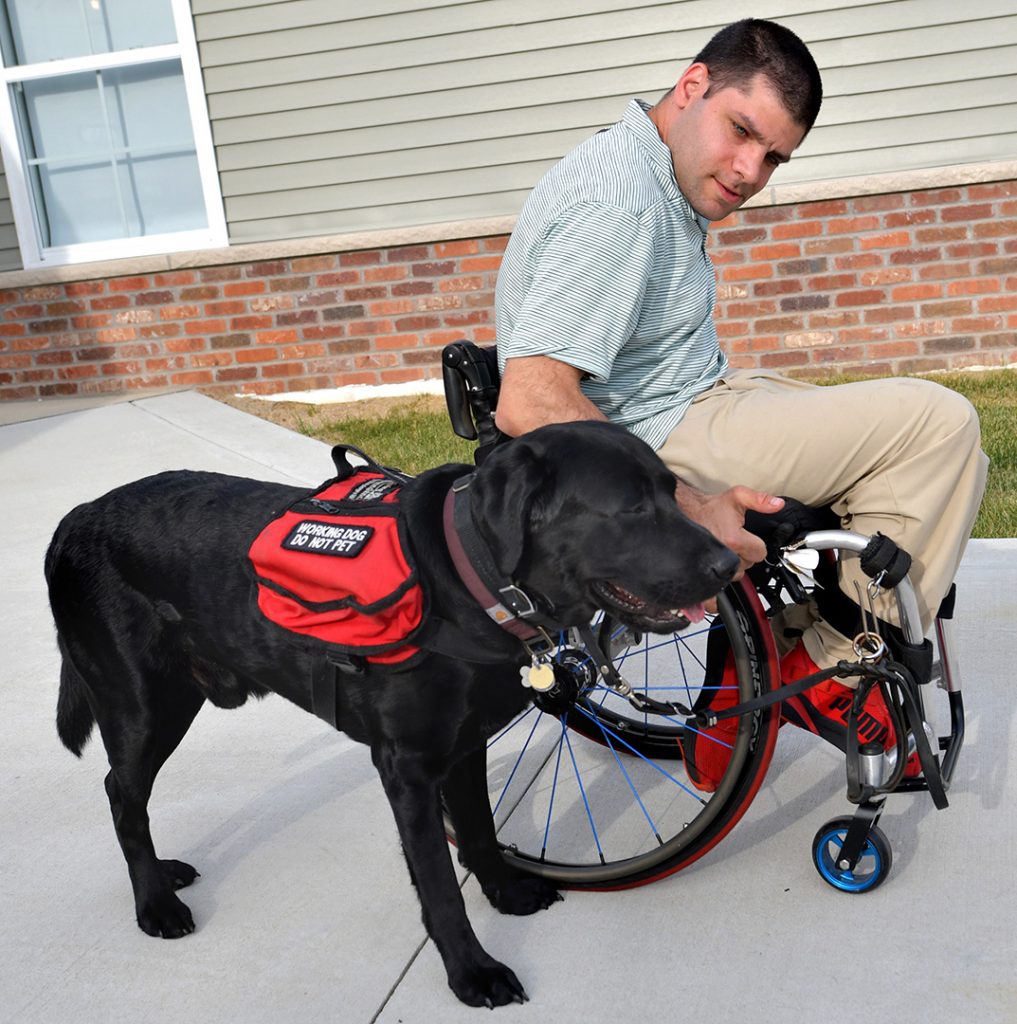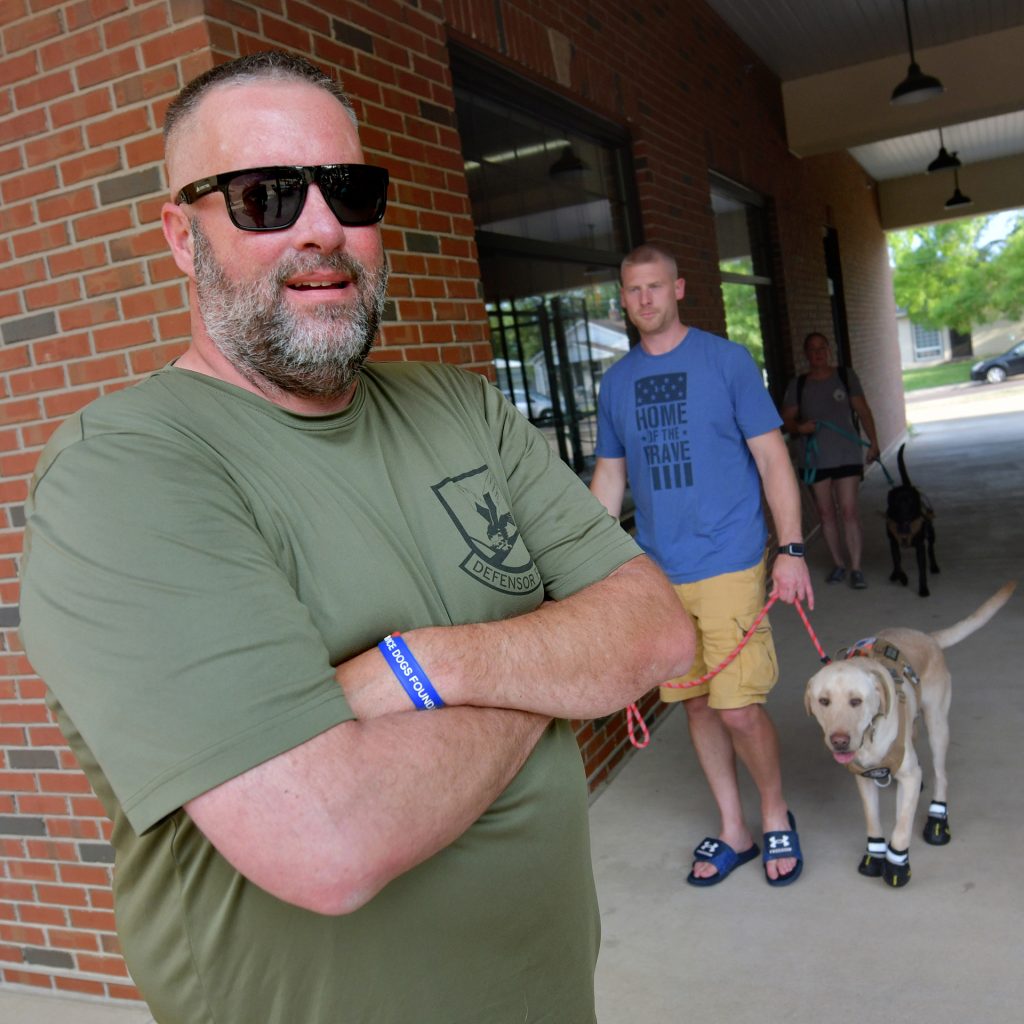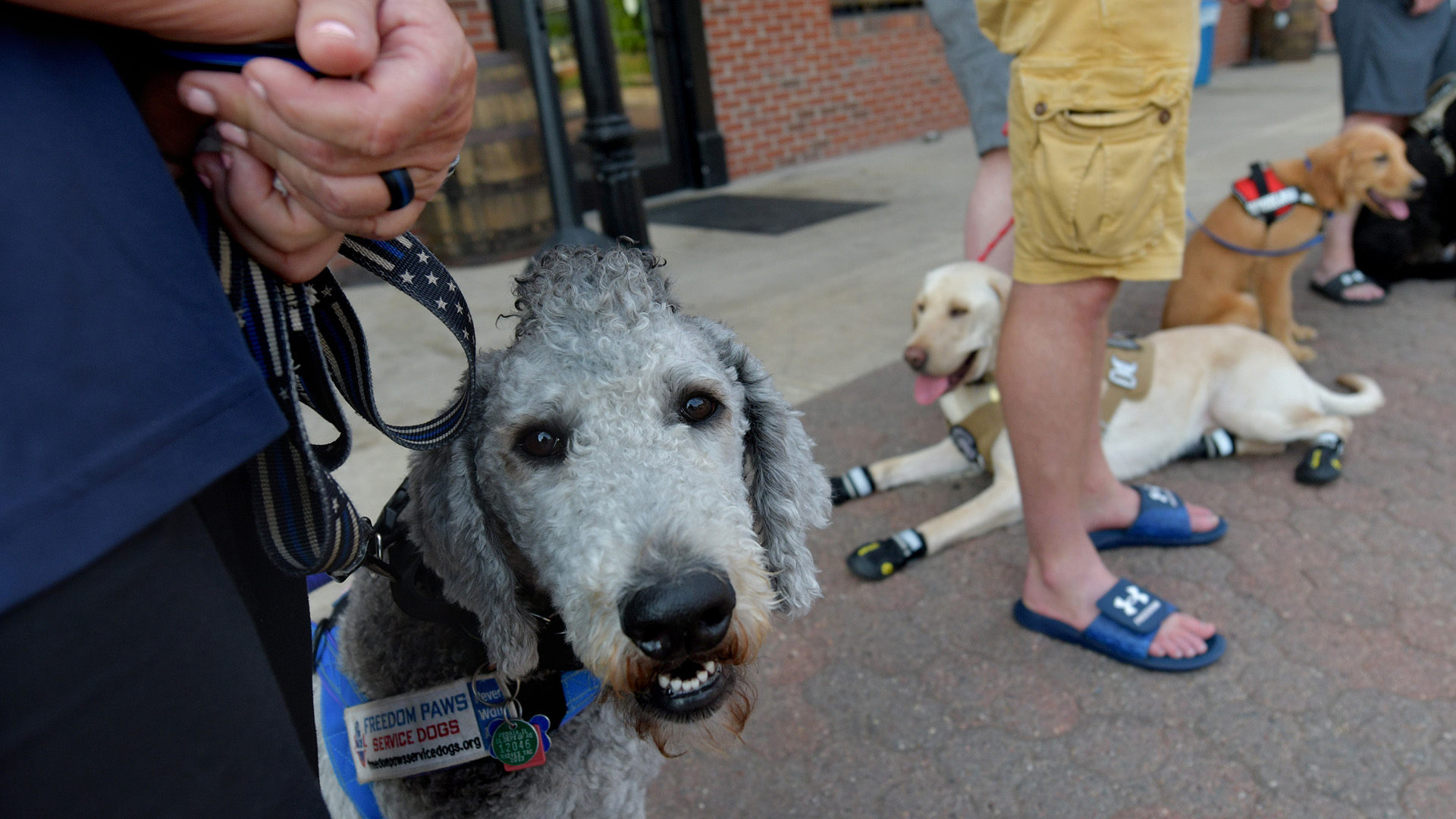Two local organizations train service dogs to help people with disabilities and struggling military veterans
Archaeological evidence shows that dogs and humans started getting friendly with one another some 30,000 years ago. Humans gave the wolves shelter, and canines helped humans hunt for food.
All along their shared journey, the loyal dog has been a trusted companion.
Two non-profit organizations in the Peoria area are building upon that historic relationship by training and matching service dogs to people with disabilities.
Paws Giving Independence
Paws Giving Independence was started in Peoria in 2008 by Donna Kosner, her daughter Michelle Yuen and their friend Brandy Weyers.
The three women had been volunteering for a service dog program in Chicago when it disbanded. They weren’t ready to walk away, and Paws Giving Independence was born.

With the help of four Bradley University professors, students were recruited to help train dogs right on the campus. Another student training group was started at Illinois State University.
“Students do a great job with socializing and the basic skills training,” said Kosner. “The people our dogs go to are going to lead active lives. They’re going to go to concerts, basketball games, Cubs games and Bears games. Besides learning the skills of pulling doors open and doing the light switches and things like that, they need to be comfortable in all settings.”
The student trainers give them that experience.
All dogs from PGI are given to their recipients free of charge.
The group must raise $55,000 a year to cover costs, with veterinary costs being the largest expense at $30,000, even though local veterinarians treat PGI dogs at a reduced cost.
Uftring Auto Group and the First Federated Church of Peoria were among the first to provide financial support to PGI and continue that support to this day. PGI is an all-volunteer organization.
Some dogs come from rescue groups and others are donated by breeders in the area.
“The breed of dog is not an issue,” said Kosner, “but because we’re placing a lot of dogs with recipients who have mobility issues, they have to be bigger dogs.” They look for dogs that will grow to be 50 to 75 pounds and tall enough to reach a light switch on the wall.
Most PGI dogs are trained to assist people who have mobility issues or are in a wheelchair. The dogs also must be able to assist people who suffer seizures, narcolepsy and fainting spells. The group recently paired a hearing assist dog with a deaf recipient.
PGI starts its training in the homes of volunteer puppy trainers. From there, at about 8 months old, the dogs go to the Logan Correctional Center through a program called Helping Paws. The inmates there train the dogs for a year.
The dogs then move in with a transition trainer, who helps the animal learn to meet the specific needs of the targeted recipient.
About 30% of the dogs don’t make it through training. If a dog can’t stop chasing squirrels, for example, doesn’t have the proper temperament or just isn’t happy in the job, it gets a “career reassignment” as a family dog.
After a match is made, the dog and recipient continue training with PGI until the pair passes a certification test.
Besides training service dogs for individuals, PGI also has 27 facility dogs working throughout central Illinois including at the Peoria County Courthouse, schools, physical therapy offices and the child advocacy center in McLean County.
PGI has placed more than 200 dogs since 2008.
“We cap our number of dogs in training at 27 to 30, because we know that’s what we can afford,” said Kosner. “Donations make it possible for us to do this.”
The 40 to 50 PGI volunteers are another necessity, said Kosner. “We just couldn’t do it without them.”
‘Like a partnership’
Steve Kouri always wanted a dog but his parents were not “dog people,” he said, so they always said no. Ultimately, they agreed, so long as it was a service dog.

Kouri, 35, has cerebral palsy that affects his fine motor skills and speech. He moves about in a wheelchair. Kouri has a bachelor’s degree from the University of Illinois and a law degree from Florida Coastal School of Law. He is employed by the State of Illinois as a commissioner for the Illinois Human Rights Commission.
Five years ago, Kouri got Duke, a Labrador/retriever mix. Duke was trained to retrieve things such as the television remote, car keys and shower towels. He would jump up and push the automatic door opener for handicapped entrances, pull Kouri in his wheelchair and help him into bed at night.
“It was like a partnership,” said Kouri. “He learned my behavior and I learned his behavior.”
Duke changed his life, said Kouri.
On May 7, Duke died of a rare form of cancer. Before the end of the month, PGI placed Bard, another Labrador, with Kouri.
Kouri, now living on his own, said working with a service dog was easier the second time around. “Bard is not Duke,” he said. “He’s a very good dog, but just like people, dogs have different personalities.”
Freedom Paws Service Dogs
Corey James, founder of Freedom Paws Service Dogs in Chillicothe, is a disabled veteran diagnosed with post-traumatic stress disorder (PTSD).

Upon leaving the Air Force after 16 years of service, James said his life was “spiraling downhill.” He was drinking alcohol to excess, trying to cope.
“My first deployment, I didn’t think it was that big of a deal, but I came back with problems,” said James.
“My wife at the time had worked for Leader Dogs for the Blind,” said James. “She suggested that a service dog would help me.” They acquired Zack, a black Labrador retriever, and started training him.
He realized that many area veterans needed trained service dogs, but there was no local organization to help them. He set about starting Freedom Paws Service Dogs for veterans and first responders, which was recognized as a non-profit organization in April 2019.
The dogs from Freedom Paws are trained to meet the psychological needs of the recipients. The group provides seven to eight dogs a year to veterans and first responders.
Some 22% of their dogs flunk out of the program, due to temperament or lack of interest. “I feel every dog has a purpose, but sometimes it’s not what we want it to be,” said James. “Sometimes the dog just doesn’t care enough. They’re dogs.”
Freedom Paws also provides service dogs at no cost, relying on donations. Most of the organization’s dogs come from seven breeders that donate one dog out of each litter. “The breeders have been a blessing, because we get quality dogs, free-of-charge,” said James.
Freedom Paws relies on 30 to 40 volunteers for training, puppy raising and fundraising.
With Freedom Paws, a dog starts out living and training with a puppy raiser for three to six months. After a pairing, the dog and its new owner continue training with Freedom Paws for another 18 months.
A major difference between training dogs for veterans and other service dog recipients is the request for block-and-cover training. Cover training teaches the dog to be on alert if someone is coming up behind its handler. Blocking teaches the dog to create a path for the handler while moving through a crowd of people.
“For a lot of people with PTSD, I find they want space,” said James.
Handlers with PTSD most often need a dog trained to sense any kind of pending emotional attack. “The dogs have changed lives,” said James.
‘She is a purpose’
Jeff Sikes and his service dog are a familiar sight in Peoria Heights. Sikes is the one riding a bright green e-bike, pulling a matching pet carrier with Wrigley, sitting up and enjoying the ride.
Wrigley was purchased for Sikes by his parents in 2019 and trained for him by Freedom Paws Service Dogs. A Siberian husky, Wrigley was 6 weeks old when Sikes got her and enrolled her in private training, costing him up to $700 per month. James from Freedom Paws reached out and offered to train Wrigley for free.
“I’m a disabled veteran on a fixed income, so that helped me a lot,” said Sikes. “A year and a half later, she became a certified service dog.”
Wrigley graduated from Freedom Paws in March, 2022.
Sikes, 49, has traumatic brain injury, causing weakness on one side of his body, and PTSD. He served in Iraq with the U.S. Army, 82nd Airborne Division. He was there for 15 months the first time, one month the second time. He went on more than 100 missions. His PTSD symptoms include anxiety and wanting to be alone.
“If you’re just sitting there not doing anything and keeping to yourself, that’s when you start having those bad thoughts. The suicide thoughts. The thoughts that the world is a bad place,” he said.
Sikes works at keeping busy. “I try to get out and do as much as I can and with Wrigley. She gave me the ability to where I now have tickets to the Chiefs games. I’m also going to get tickets for the Rivermen.
“It’s important … to try and be involved because that’s where the therapy happens. It means cheering when they make a good play, being aware of everybody around you and how happy they are …”
Without a service dog, Sikes said there would be no way he could go to a sporting event or talk to strangers on the street.
“A lot of things with anxiety goes on with me and Wrigley keeps me calm, just knowing she’s there,” said Sikes.
“It’s a dual relationship we have. I know that she’s there, she’s got my back, she’s always looking out for me. But at the same time, I’m there, I have to look out for her, so it gives me the responsibility that I have somebody else to look out for. That releases my anxiety as well, just having a purpose. She is a purpose.”





